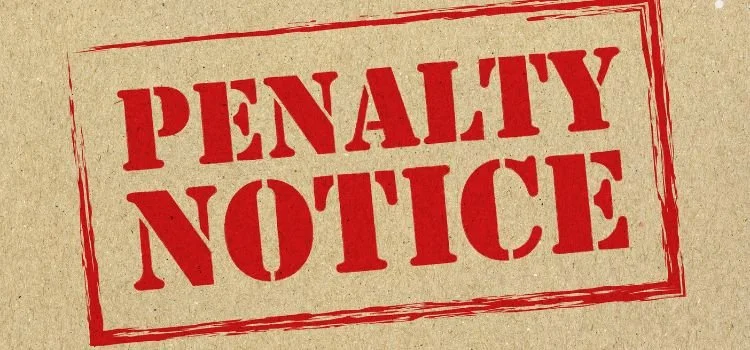What to Do When You Have Been Fined by HMRC as a Small Business Owner
Few things create more panic for small business owners than opening a letter from HMRC to find you’ve been fined.
It’s not just the money, it's the fear of what it means for your business, your cash flow, and your reputation.
In 2024 alone, thousands of UK small businesses were fined for late filing, late payments, or inaccuracies in their tax returns. HMRC penalties can range from as little as £100 for a late Self Assessment filing, to thousands of pounds for repeated VAT return errors.
And here’s the tricky part: penalties don’t just disappear. If you ignore them, interest and additional charges will stack up, leaving you with an even bigger problem down the line.
The good news? You don’t have to face HMRC fines alone or let them spiral out of control. By understanding why fines happen, taking the right action straight away, and putting smarter financial processes in place, you can get back on track and prevent future headaches.
In this post, we’ll walk you through why small businesses get fined by HMRC, what to do immediately after receiving a fine, and how to protect your business from future penalties.
HMRC as a Small Business Owner
Why Do Small Businesses Get Fined by HMRC?
HMRC fines often feel like they’ve come out of nowhere, but in most cases, they’re triggered by specific compliance issues.
If you’re a small business owner, chances are one of the following led to your penalty:
Late filing of tax returns: Whether it’s your Self Assessment or Corporation Tax return, missing the deadline even by a single day can result in an automatic fine of £100. For ongoing delays, penalties can increase to £1,600 or more.
Late payment of tax: Paying your tax bill after the deadline can lead to fines plus daily interest charges, which can quickly add up.
VAT return errors: If you’re VAT-registered, HMRC may fine you for mistakes in your return, particularly if they believe you were careless or deliberately misleading.
PAYE and National Insurance mistakes: Employers must submit accurate Real Time Information (RTI) to HMRC. Late or incorrect submissions can trigger penalties.
In short, most fines aren’t about fraud, they’re about admin slips, missed deadlines, or misunderstandings of HMRC’s rules. And with HMRC tightening its digital systems, errors are more likely to be picked up than ever before.
(For reference, you can check HMRC’s current penalty rules here: HMRC Penalties and Appeals)
What Should You Do Immediately After Receiving an HMRC Fine?
The worst thing you can do after receiving an HMRC penalty notice is ignore it. Acting quickly is key to minimising the financial and emotional impact. Here’s what you should do next:
Read the notice carefully – Don’t panic. Take the time to understand why the fine was issued, the amount, and the deadline for either payment or appeal.
Check for errors – HMRC can and does make mistakes. Compare the notice against your records. Did you actually miss a deadline? Was the return filed late, or could it have been an HMRC system error?
Respond promptly – If you agree with the fine, pay it as soon as possible to avoid interest charges. If you believe it’s incorrect, you usually have 30 days to appeal.
Contact HMRC – If you’re struggling to pay, speak to HMRC about setting up a Time to Pay arrangement. This allows you to spread the cost of your fine and tax bill over manageable instalments.
Seek professional help – If the penalty is large, unclear, or linked to complex areas like VAT or PAYE, get an accountant involved. They can review your case, liaise with HMRC, and even handle appeals on your behalf.
By taking these steps immediately, you’ll show HMRC that you’re addressing the issue seriously, and that can often work in your favour if you need leniency.
Can You Appeal an HMRC Fine as a Small Business Owner?
Yes, you can appeal an HMRC fine if you believe it was issued unfairly or in error.
Many small business owners assume penalties are set in stone, but HMRC has an appeals process that allows you to challenge decisions. The key is showing that you had a reasonable excuse or that HMRC themselves made a mistake.
A reasonable excuse could be something outside your control, like serious illness, technical problems with HMRC’s online system, or an unexpected event such as a bereavement. Simply forgetting or not knowing the rules isn’t considered valid, but if you can provide evidence of genuine circumstances, HMRC will consider reducing or removing the fine.
To appeal, you’ll normally need to:
Submit your appeal within 30 days of the penalty notice.
Provide evidence (such as medical certificates, bank statements, or email records).
Use HMRC’s online appeals service or send a written letter explaining your case.
If HMRC rejects your initial appeal, you can escalate it to an independent tribunal. While not every appeal is successful, small businesses that present clear evidence often have a strong chance of reducing their liability.
For detailed guidance on appeals, visit the official HMRC Penalties and Appeals page.
How Can You Prevent Future HMRC Penalties in Your Business?
Prevention is always better than cure. Once you’ve dealt with a fine, your focus should shift to making sure it doesn’t happen again.
Small businesses often juggle multiple responsibilities, and admin tasks like tax deadlines can easily slip through the cracks but with the right systems in place, you can stay compliant without the stress.
Some proven ways to prevent future fines include:
Use accounting software: Platforms like Xero, QuickBooks, or Sage automatically remind you of deadlines and simplify tax submissions. They also reduce the risk of manual errors that could trigger penalties.
Keep accurate records: Maintain well-organised bookkeeping with up-to-date invoices, receipts, and bank reconciliations. This makes reporting faster and less stressful.
Set reminders for deadlines: Mark important HMRC deadlines such as Self Assessment (31 January), Corporation Tax (12 months after year-end), and VAT returns (quarterly) in both digital and physical calendars.
Work with a trusted accountant: Outsourcing your accounts ensures someone experienced is always watching over compliance and tax requirements.
By being proactive, you’re not just avoiding penalties, you’re building a business that runs smoothly and frees up your time for growth.
Prevent Future HMRC Penalties
When Should You Seek Professional Help with HMRC Fines?
There’s no shame in asking for professional help, especially when HMRC fines start to feel overwhelming.
Small business owners often leave fines to the last minute, hoping they’ll sort themselves out, but this usually makes matters worse.
You should seek help from an accountant or tax adviser if:
You’ve received multiple fines and don’t understand why.
The fine amount is significant, and you’re unsure how to pay or appeal.
You suspect your bookkeeping or VAT returns contain errors.
You’re considering appealing and need professional guidance.
An accountant can do more than just review your penalties. They can:
Identify the root cause of the fine and fix your compliance processes.
Negotiate with HMRC on your behalf (including setting up payment plans).
Put systems in place so you never miss a deadline again.
Working with a professional is an investment in peace of mind. Rather than firefighting penalties, you’ll have confidence that your finances are in safe hands.
Conclusion
Dealing with an HMRC fine as a small business owner can feel overwhelming, but it doesn’t have to define your journey.
Yes, penalties can be frustrating, costly, and even shake your confidence, but they’re also a wake-up call to put stronger systems in place.
By understanding why fines occur, responding promptly, learning how to appeal when necessary, and developing habits that prevent future penalties, you’re not just protecting your business; you’re giving it the foundation to thrive.
Think of it this way: every fine is a reminder that financial compliance is just as important as sales and customer service. With the right tools, planning, and, when needed, professional help, you can transform a stressful situation into an opportunity for growth.
If you’ve taken one thing from this post, let it be this: you don’t have to face HMRC alone.
With clear guidance and expert support, compliance becomes simpler, less stressful, and more manageable.
Take action today, review your systems, set reminders, or reach out for advice, so you can spend less time worrying about penalties and more time building the business you set out to create.
Meet Lewis
Lewis is a professional accountant and founder of Rhombus Accounting. He regularly shares his knowledge and best advice here on his blog and on other channels such as LinkedIn.
Book a call today to learn more about what Lewis and Rhombus Accounting can do for you.



